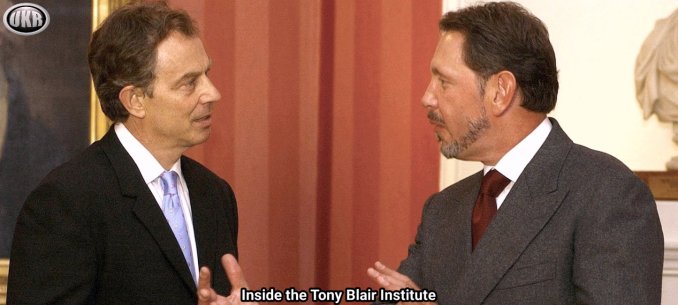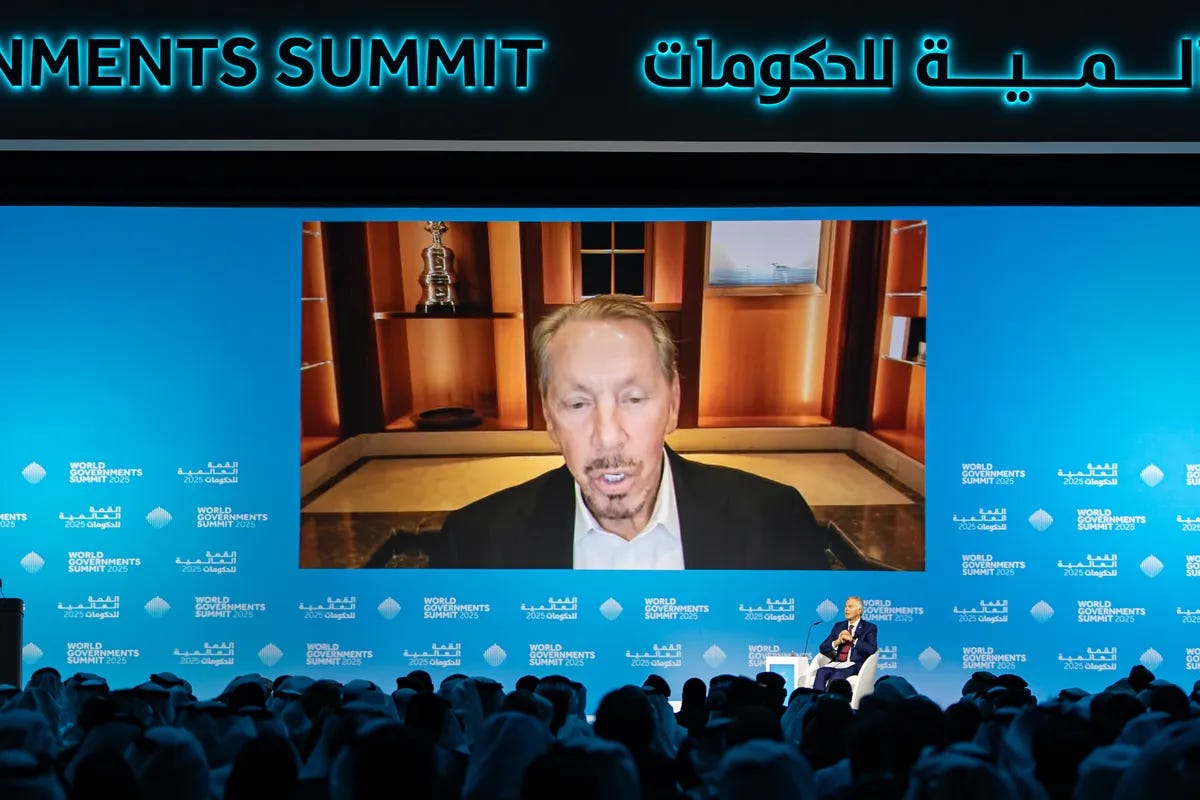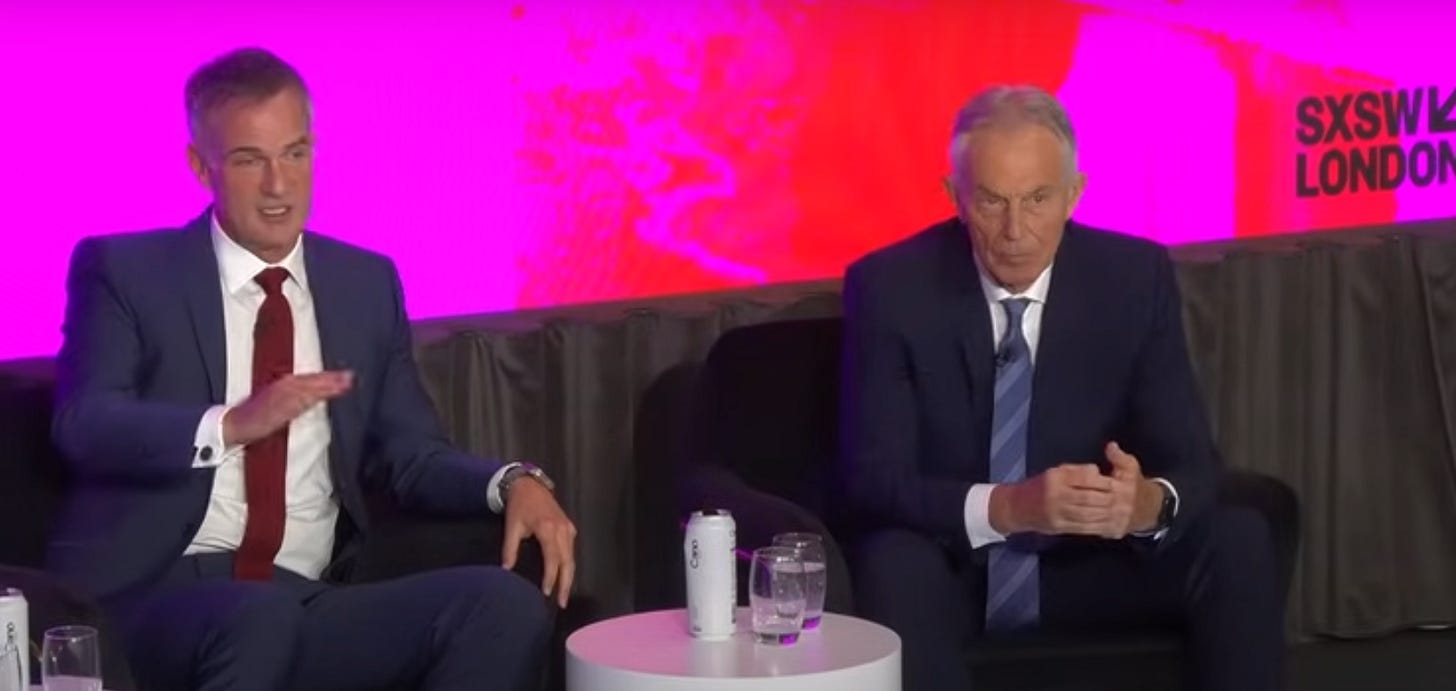
Larry Ellison’s £257m bet on Tony Blair
A former PM, Trump’s ‘CEO of everything’ and NHS data – what could go wrong?
PETER GEOGHEGAN, LUCAS AMIN, MAY BULMAN
Tony Blair looked smaller somehow. Seated alone on a huge Dubai stage with ranks of political leaders filling the auditorium in front of him at the World Governments Summit in February, he sounded hoarse as he introduced his patron.
Looming over him on a giant screen was Larry Ellison, founder of Oracle, the company whose share price in September briefly made him the richest man in the world.
Now 81, Ellison remains a figure of fascination and intrigue in Silicon Valley, and just as monomaniacal as ever in his drive to remake the world. When Ellison’s first biography appeared in 1997, it was titled: The Difference Between God and Larry Ellison: *God Doesn’t Think He’s Larry Ellison. In the years since, Ellison’s fortune has ballooned to almost $400bn, bringing him close to his good friend Elon Musk.
At the conference in Dubai, Ellison began with a joke about Musk before warning the audience that artificial super-intelligence was coming sooner than expected. What, Blair asked him, should governments be doing about it? “The first thing a country needs to do is unify all of their data so that it can be consumed and used by the AI model,” Ellison responded.
Ellison was also specific about which data needed unifying – and he had an example in mind: “The NHS in the UK has an incredible amount of population data,” he declared, but it was too “fragmented” at present. Below him, the former prime minister nodded, clutching his Tony Blair Institute (TBI) notebook.
Two weeks later, the TBI published a report entitled “Governing in the Age of AI: Building Britain’s National Data Library”. In it, Blair’s organisation echoed Ellison on the UK’s data infrastructure, calling it “fragmented and unfit for purpose”.
Speak to anyone close to Blair and they will confirm his conviction in the revolutionary potential of AI. The former prime minister believes it will completely reshape the global economy in ways that political leaders the world over are only just starting to realise.
Still, Blair’s critics – including many former employees at the TBI who spoke on condition of anonymity for this investigation – are concerned about the influence that he and, by extension, Ellison, are able to wield on some of the most contentious questions relating to the regulation of this emerging and potentially revolutionary technology.
Irrespective of the sincerity of Blair’s convictions over the benefits of AI, it is also the case that Ellison’s Oracle has major commercial interests at stake in the question of which companies get access to Britain’s most valuable data.
Since 2021, Ellison’s personal foundation – the Larry Ellison Foundation – has donated or pledged at least £257m to the Tony Blair Institute, making it a think tank like no other in the UK. Ellison donations have helped it grow to more than 900 staff, working in at least 45 countries.
TBI enjoys US levels of funding and influence, so while UK counterparts such as Policy Exchange and the Institute of Public Policy Research had incomes of £4.3m in 2023-24, TBI’s turnover in 2023 was $145.3m. The institute has insisted that Ellison is just one among many major funders and its chief policy strategist, Benedict Macon-Cooney, told media that there was “no conflict of interest, and donations are ringfenced”.

Blair himself takes no salary from TBI. In recent years it has been able to recruit from blue-chip firms such as the consulting giant McKinsey and the Facebook owner, Meta. In 2018, before the Oracle founder’s funding surge, TBI’s best-paid director earned $400,000. In 2023, the last year that accounts are available for, the top earner took home $1.26m.
Some TBI staff – including a number who left in recent years because of Ellison’s influence – say the cash injection has produced a culture that is dominated by a form of AI boosterism, and which, as they see it, amounts to lobbying for Oracle.
The investigative newsrooms Democracy for Sale and Lighthouse Reports interviewed 29 current and former TBI staff, most on condition of anonymity. Supported by public documents and those obtained under freedom of information (FoI) laws, the testimony describes an organisation unusually close to the British government, able to lobby ministers directly, and which holds joint retreats with Oracle and is willing to engage in “tech sales” with governments in the rest of the world. While there is no suggestion of illegality, there are growing concerns about the extent to which the interests of a US tech billionaire are being represented by the former prime minister.
“When it comes to tech policy,” said one former senior adviser at TBI, “Oracle and TBI are inseparable.”
A TBI spokesperson said: “TBI and Oracle are two separate entities. We collaborate with Oracle to help the work we do in supporting some of the poorest countries in the world, and we are proud of this… TBI does not advocate for Oracle’s commercial interests, nor does it advocate for any tech provider.”
Both Oracle and the Larry Ellison Foundation did not respond to a request for comment for this article.
Land of hope and data
Ellison and Blair’s relationship began with the Chicago-raised entrepreneur making charitable donations. In 2003 Ellison and Blair, then in his pomp, had a photo opportunity at Downing Street to mark a gift of supplies to 40 specialist schools. In more cynical tech circles such practices are known as “land and expand”.
Oracle has since been contracted hundreds of times by the British government and earned £1.1bn in public-sector revenue since the start of 2022, according to data collected by the procurement analysts Tussell.
Ellison has long appeared to understand the importance of political connections. While the Oracle founder was a late convert to Donald Trump, the company’s CEO, Safra Catz, worked on the US president’s transition team in 2016. Ellison was feted by Trump as the “CEO of everything” after his return to office this year.
Trump named Ellison among the investors to be involved in TikTok’s US operations, and the billionaire’s son, David Ellison, has taken charge of Paramount after a merger with his company Skydance. The new conglomerate is reported to be working on an offer for Warner Bros Discovery, which owns the news channel CNN.
Ellison’s relationship with Blair, meanwhile, has blossomed over the past few years. In 2022, the former prime minister recorded a personal video message for Oracle lauding a “shared vision to advance global health”, by building unified electronic health records, a data set “stored in one place, where it can be analysed and utilised for the purpose of improving health outcomes”. Last year, the pair even holidayed together off the Sardinian coast.

The interest shown by Ellison and the TBI in Britain’s health records is understandable. Because of the nature of the NHS, it holds unique population-level health data. Tech experts talk about Britain’s health records in almost hushed tones. While Europe and the US has some comparable health data sets – such as US veterans’ medical records – none have the depth and breadth of NHS records dating back to 1948. Their potential commercial value, from drugs to genome sequencing, has been estimated at up to £10bn per annum.
Labour pains
When Labour came to power last July, it did so promising economic growth and an end to the UK’s productivity crisis. Just five days after Keir Starmer was elected, Blair told the TBI’s “Future of Britain” conference that AI was the “game-changer” they were looking for. Not everyone is convinced.
“There is a real hard sell going on here that says: ‘These kinds of gains are inevitable.’ But they are not,” said Gina Neff, professor of responsible AI at Queen Mary University. “TBI is not advocating for building that capacity within the NHS. They are saying: let’s outsource to our buddies.”
The TBI, however, was welcomed by Keir Starmer’s Downing Street operation, which includes many figures with close connections to the former prime minister. Peter Kyle, an adviser in Blair’s second term, was appointed technology secretary and called on governments to show “a sense of humility” towards Big Tech companies.
TBI had been laying the groundwork before Labour won power. Institute staff advised the party in opposition. In May 2024, TBI wrote a report that called for “two radical actions” to fix Britain’s “data-access problem”: create a “single front door” providing “seamless access” to NHS data; and host all of this data outside the NHS, while retaining government control of the programme.
Less than two months after Starmer’s win, the TBI health policy director Charlotte Refsum was invited into the Department of Health to meet its digital policy chief, Felix Greaves, documents obtained under FoI show. Greaves asked for her help in designing a giant public consultation on GP data and digital health ID. He was briefed to tell Refsum his department needed to “learn lessons” from previous health data scandals which had hardened public opinion against data-sharing with private firms.
Refsum was then given an official role in a government working group advising on data and technology policy in Labour’s ten-year plan for the NHS. When that plan was published it contained both of TBI’s two radical ideas. The new “health data research service” would act as the front door to provide “a single, secure gateway to health and care data” and it would be mainly funded by the government but hosted by the Wellcome medical research charity.
The TBI’s connections at the heart of government are not merely political, either. The institute’s summer party, held at McKinsey’s London headquarters of, coincided with the launch of the NHS ten-year plan. The event was co-hosted by the chair of NHS England Penny Dash – herself an ex-McKinsey partner – with “senior leaders from the NHS, private sector, pharmaceutical and biotech companies and investors” among the invited guests.
Perhaps unsurprisingly, in an August 2024 paper on “preparing the NHS for the AI era”, TBI found “good reasons” for building new digital health records with an existing system run by Oracle. It also said that using a system run by rival Palantir – the £330m Federated Data Platform – would be “a controversial option” and that its product had “been slow to make progress, in part due to opposition from data-privacy groups”.
In a later paper, TBI recommended linking up data from the NHS, the Department for Work and Pensions, and HMRC. All three bodies are Oracle clients.
A TBI spokesperson said: “We don’t advocate for technology solutions because we work with Oracle. We work with Oracle and other technology companies because we believe technology holds the key to the future. TBI is impartial when supporting government clients in technology delivery. The choice of technology provider is solely a government decision.”
This month Kirsty Innes, former director of the TBI’s digital government unit, and then director of tech policy at Labour Together, joined the Department of Science, Innovation and Technology as a special advisor.
Elsewhere, TBI staff were brought directly into government while still on the institute’s payroll. Tom Westgarth was part of the Department for Science, Technology and Innovation, joining the small team working on the government’s AI Opportunities Action Plan. His salary was paid by TBI.
Documents also show Blair personally intervened to urge Kyle to embrace AI, telling him in a private meeting that there was “no other solution to productivity, no other route to growth”, and that AI was “the UK’s economic future”.
Blair also encouraged Kyle to meet with the Ellison Institute of Technology, a for-profit research institute that works via a group of internal companies based in Oxford funded by the Oracle chief – and “emphasised the importance of the national data library”, according to a response to an FoI. In May, Kyle told his officials to work with TBI on the nascent national data library (NDL) project. “Attaching the initial scoping work from TBI here,” he wrote in an email to his team.

A UK government spokesperson said it engaged with a “wide range of stakeholders” in the development of policy, adding: “The government publishes quarterly details of ministers’ and certain senior officials’ meetings with all external individuals and organisations.”
The NDL was little more than an idea when Labour put it in its election manifesto. And there are still competing visions for what the library should be. AI boosters foresee data from across government used for training and inference by large language models, while many tech experts want to minimise privacy risks inherent in pooling data from so many sources and ensure that any benefits accrue to the UK.
“Of course the NHS should use data better to help patients and improve the health service,” said Cori Crider, honorary professor at UCL Laws and the executive director of the Future of Tech Institute. “But what’s good for Larry Ellison may not be best for the NHS.”
“Uncle Larry”
Oracle and TBI’s connections are not just rhetorical. By 2023, they were holding joint retreats. At the institute’s headquarters at One Bartholomew Close in central London, the teams would convene with executives from Oracle, Blair’s key adviser Macon-Cooney and Awo Ablo – who came to sit on the board of both TBI and Oracle – sometimes present.
Senior TBI employees have been hosted at Oracle’s headquarters in Austin, Texas, coordinated by a TBI employee whose role is “scaling and managing” the partnership with Oracle. Former staff recall that there were other earlier “hush-hush” joint retreats at Ellison properties in the US.
“It’s hard to get across just how deeply connected the two [organisations] are,” a former TBI staffer said. “The meetings were like they’re part of the same organisation.”
While Blair is known to be frustrated by those who question his motivations and those of other tech evangelists, there is no doubt that the extent of the TBI’s partnership with Oracle has become a source of serious concern not just for the former prime minister’s political critics, but for many of his former employees who continue to admire him personally.
Former staff interviewed for this piece had in some cases been attracted to the TBI by Blair’s vision of what technology could do for people and governments around the world, but describe becoming increasingly disillusioned as the Ellison money washed through it. “It felt icky,” recalls one, while another said: “I was being pulled into what felt a lot like tech sales and tech PR… We had an angle, and the angle was more tech, big tech, all the time.”
Many speak of a sea change in the culture of the organisation following Ellison’s major donations. McKinsey consultants took senior positions and clashed with staff from humanitarian and development backgrounds.
Oracle staff started to slide into institute employees’ calendars and schedule meetings to “scope out opportunities”, according to one former TBI staffer. Soon employees from the two entities were having regular joint calls.
This sat uncomfortably with many TBI staff, some of whom did not believe Oracle’s technology was always in the best interests of the country in which they were working.
The risk of so-called vendor lock in – tying a buyer to a single supplier – was a source of unease among some, with one former staffer saying that advising governments to use Oracle cloud services risked “trapping” and “indebting” them in systems that are “initially free but will start charging in future”.
Rwanda, a country in which TBI has had a presence for more than 15 years, was so frustrated with Oracle it issued a public tender in 2021 for a database management system, stating it had been “experiencing a very high cost for support and licensing for Oracle systems and it would like to migrate to an affordable system”.
A TBI spokesperson said it did not get involved in the tech procurement processes of its client governments.
The institute’s financial documents show “tech-related support” was offered to more than four out of five of its portfolio countries in 2022, compared with one in five in 2020. Former staff say the organisation’s “tech optimist” approach led to a failure to acknowledge potential disadvantages or dangers of technology solutions. Two employees recall that sections about risks in their draft report started being removed.
Marvin Akuagwuagwu worked as a data analyst for TBI’s Africa Advisory unit in 2022 and 2023, focusing on Covid vaccine delivery. He said that legitimate concerns he raised, such as a lack of power supply and cybersecurity threats, when introducing new technologies to African countries were dismissed by more senior colleagues.
Akuagwuagwu also described how TBI would push technology and AI solutions on countries with far more fundamental issues to contend with: “They have issues around hunger, poverty, mass unemployment – and we’re getting them to commit towards some fancy projects like using drones and AI.”
Blair argues that such opposition to Big Tech – and those who have made their fortune from its success – stops progressive political parties grappling with the trade-offs and benefits of the unfolding AI revolution. The former PM certainly believes that cutting-edge technology can be used to improve governance in some of the poorest countries on Earth, saving lives in the process.
Still, the disconnect between such lofty aspirations and the challenges facing some countries where the TBI operates can be striking. In Ethiopia, with the country on the brink of civil war in 2020, the TBI was working on a draft AI policy, seen by this investigation, which called for the introduction of self-driving cars.
The paper cites the “enormous global market potential that lacks access to experimental settings” and the country’s “ideal terrain variations and regular real-world testing opportunities”. One of the authors appears to catch the dissonance, writing in a visible comment: “So we’re saying test in Ethiopia because of its challenging terrain…?”
Kenya’s capital, Nairobi, with its UN headquarters and large diplomatic presence, was an important hub for TBI. But former staff complain that a previously broad range of work shrunk to pushing Oracle technology. Kenyan government officials had Oracle pitched to them so often, one recalled, that they would refer sarcastically to “Uncle Larry”.
There is deep disquiet among many current and former TBI staff over the conflation of complex public interests with corporate priorities. Despite their founder’s noted evangelical zeal for AI and its billionaire architects, there still is a difference between Larry Ellison and God.
A version of this piece appeared in the New Statesman. Reporting for this story was supported by the Big Tech Invisible Hand coalition led by Agência Pública and the Centro Latino-americano de Investigación Periodística.
Investigations like this take a lot of time and resources. If you haven’t already, please consider upgrading to a paid subscription.
With your support we can hold powerful people and their backers to account.
This article (Larry Ellison’s £257m bet on Tony Blair) was created and published by Democracy for Sale and is republished here under “Fair Use”
Featured image: UnHerd

••••
The Liberty Beacon Project is now expanding at a near exponential rate, and for this we are grateful and excited! But we must also be practical. For 7 years we have not asked for any donations, and have built this project with our own funds as we grew. We are now experiencing ever increasing growing pains due to the large number of websites and projects we represent. So we have just installed donation buttons on our websites and ask that you consider this when you visit them. Nothing is too small. We thank you for all your support and your considerations … (TLB)
••••
Comment Policy: As a privately owned web site, we reserve the right to remove comments that contain spam, advertising, vulgarity, threats of violence, racism, or personal/abusive attacks on other users. This also applies to trolling, the use of more than one alias, or just intentional mischief. Enforcement of this policy is at the discretion of this websites administrators. Repeat offenders may be blocked or permanently banned without prior warning.
••••
Disclaimer: TLB websites contain copyrighted material the use of which has not always been specifically authorized by the copyright owner. We are making such material available to our readers under the provisions of “fair use” in an effort to advance a better understanding of political, health, economic and social issues. The material on this site is distributed without profit to those who have expressed a prior interest in receiving it for research and educational purposes. If you wish to use copyrighted material for purposes other than “fair use” you must request permission from the copyright owner.
••••
Disclaimer: The information and opinions shared are for informational purposes only including, but not limited to, text, graphics, images and other material are not intended as medical advice or instruction. Nothing mentioned is intended to be a substitute for professional medical advice, diagnosis or treatment.
Disclaimer: The views and opinions expressed in this article are those of the author and do not necessarily reflect the official policy or position of The Liberty Beacon Project.






Leave a Reply